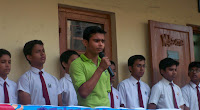The Portrait Gallery of the Victoria Memorial was the venue of the book reading of Amitav Ghosh's latest book River of Smoke on the 19th of June, 2011. As a member of The Anthonian Literary Club, I was privileged to cover the event. It was a great opportunity to be in close quarters with the creator of characters like Alu, Tridib, May, Murugan, Piya, Fokir, Kalua, Deeti, and Ah Fatt. The reading session was chaired by the eminent historian Sabyasachi Bhattacharya and the other panelists were the academicians Supriya Chaudhuri and Rimi B. Chatterjee.
Under the hallowed precinct of the colonial mansion, which Amitav Ghosh termed as the "Opium Memorial", since it was the British opium trade that funded its construction, the writer read an excerpt and spoke about his new book, the second of the Ibis trilogy. The first book of the trilogy was Sea of Poppies, which was shortlisted for the Man Booker Prize 2008.
Amitav Ghosh has written seven novels till date. His first novel, The Circle of Reason, was awarded France’s Prix Médicis in 1990, and The Shadow Lines won two presitigious Indian prizes the same year, the Sahitya Akademi Award and the Ananda Puraskar. The Calcutta Chromosome won the Arthur C. Clarke award for 1997 and The Glass Palace won the International e-Book Award at the Frankfurt book fair in 2001. In January 2005 The Hungry Tide was awarded the Crossword Book Prize.
Ghosh said that it was his love of history and a tactile sense of the past that made it possible for him to blend history with his fiction. At the academic level history is written much like philosophy, he surmised. Whereas he is trying to reconstruct the past in his fiction. He acknowledged the difficulties of writing the second book of a trilogy, since it is always in media res, but Ghosh sees his book both as an independent work and as part of a trilogy. It is perhaps this important facet of his writing that each of his work has a life of its own, the characters come out of history, inhabit the present and go into posterity. The power of this writer to create in the mind of his reader a world of his characters is what makes him special.
Under the hallowed precinct of the colonial mansion, which Amitav Ghosh termed as the "Opium Memorial", since it was the British opium trade that funded its construction, the writer read an excerpt and spoke about his new book, the second of the Ibis trilogy. The first book of the trilogy was Sea of Poppies, which was shortlisted for the Man Booker Prize 2008.
Amitav Ghosh has written seven novels till date. His first novel, The Circle of Reason, was awarded France’s Prix Médicis in 1990, and The Shadow Lines won two presitigious Indian prizes the same year, the Sahitya Akademi Award and the Ananda Puraskar. The Calcutta Chromosome won the Arthur C. Clarke award for 1997 and The Glass Palace won the International e-Book Award at the Frankfurt book fair in 2001. In January 2005 The Hungry Tide was awarded the Crossword Book Prize.
Ghosh said that it was his love of history and a tactile sense of the past that made it possible for him to blend history with his fiction. At the academic level history is written much like philosophy, he surmised. Whereas he is trying to reconstruct the past in his fiction. He acknowledged the difficulties of writing the second book of a trilogy, since it is always in media res, but Ghosh sees his book both as an independent work and as part of a trilogy. It is perhaps this important facet of his writing that each of his work has a life of its own, the characters come out of history, inhabit the present and go into posterity. The power of this writer to create in the mind of his reader a world of his characters is what makes him special.














